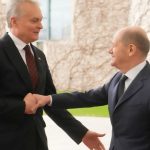Jen Psaki (White House press secretary) suggested that Russian President Vladimir Putin’s isolation during the pandemic might have affected his decision making while he goes ahead with his devastating invasion of Ukraine.
Lawmakers are now questioning Putin’s mental health after he invaded Ukraine in full-scale. He also made an address suggesting that his military goals were more ambitious than those of Kyiv.
Psaki stated that he was not only justifying the invasion of a sovereign country but had ambitions beyond it in his speech last week to ABC’s “This Week” anchor George Stephanopoulos.
Marco Rubio, a Florida Republican Senator, used Twitter this week to challenge Putin’s sensibility. He stated: “I wish I could share more, but for now it is pretty obvious to many that something’s wrong with Putin. ”
He was a murderer but now his problem is more serious.
Psaki said that she would not comment on Putin’s mental state, but it was obvious that the Kremlin leader operates according to different international standards.
Psaki stated that he was “quite isolated” during COVID. “But, I will tell you, certain the rhetoric and actions he makes to justify his actions are certainly deeply concerning for us,” Psaki said.
Despite Moscow’s massive military buildup in the weeks preceding this week’s invasion of Ukraine, the Ukrainian army has held back Russian troops for four days.
On Saturday, senior defense officials said that more than half of the 150,000 troops stationed at Ukraine’s border had invaded the country.
Russia so far has not been able take full control of any Ukrainian cities or to gain air superiority.
NATO’s top allies Germany and Germany have dropped reservations about Russia being expelled from SWIFT. Psaki said Saturday that sanctions were applied to 80 percent Russia’s financial industry.
Psaki said that yesterday’s sanctions were on par. This means Russia and Iran are now on the same level, cutting off access to the global banking system.
The post Psaki Suggests Putin’s Isolation During Pandemic Could Be At Play appeared first on Conservative Research Group.


